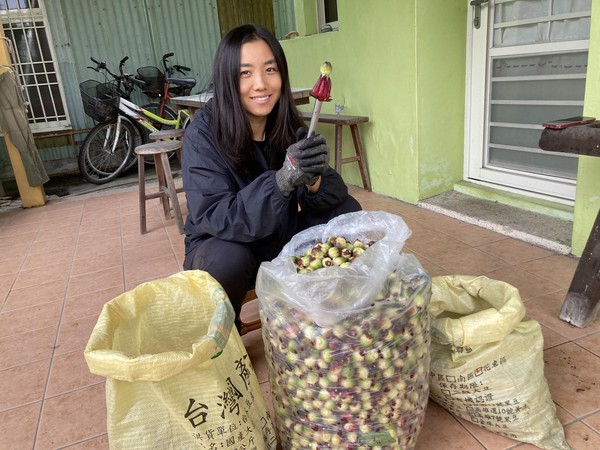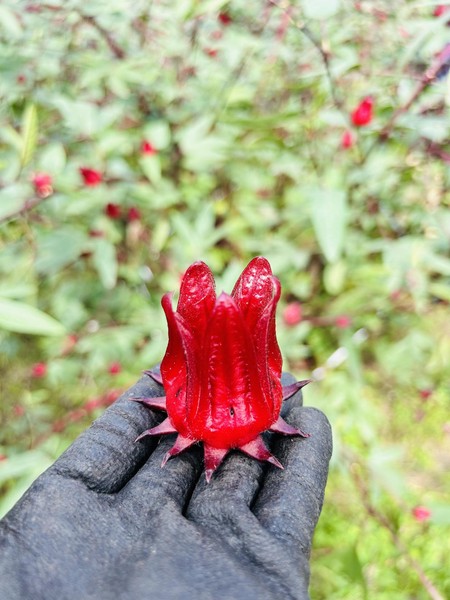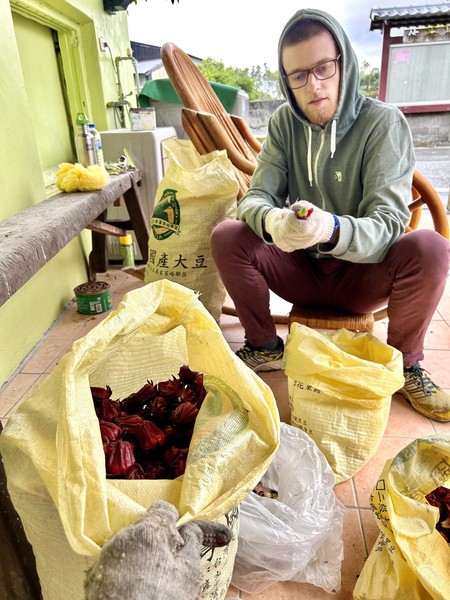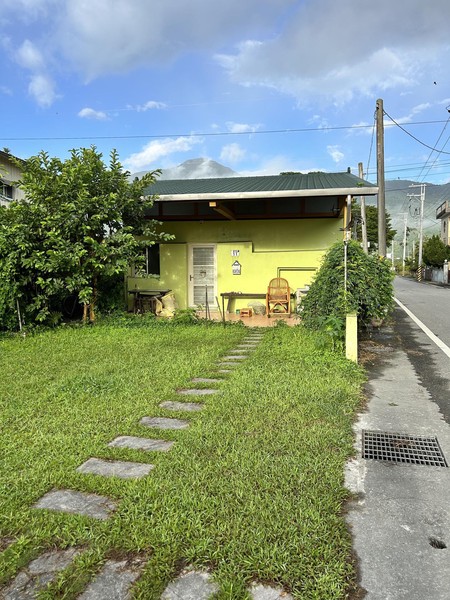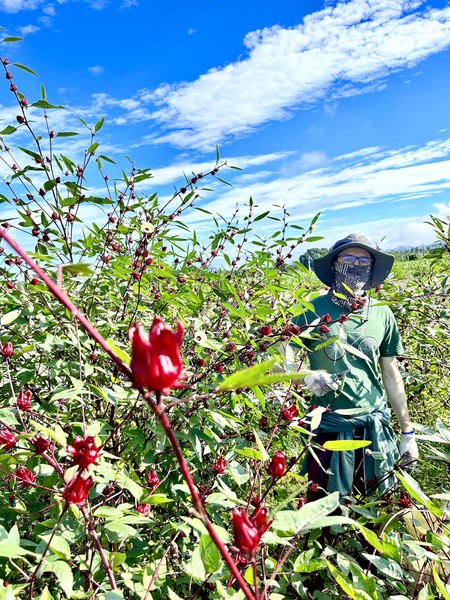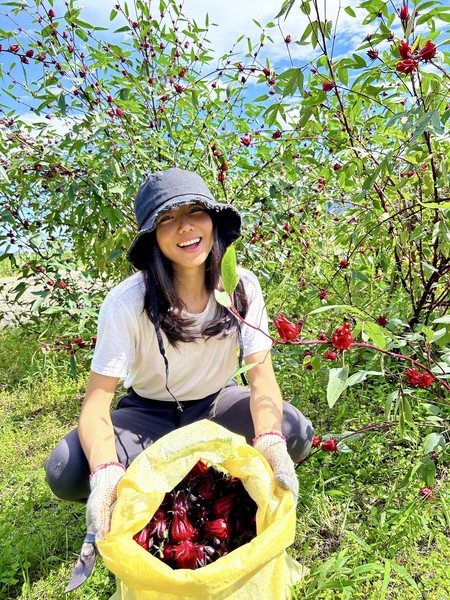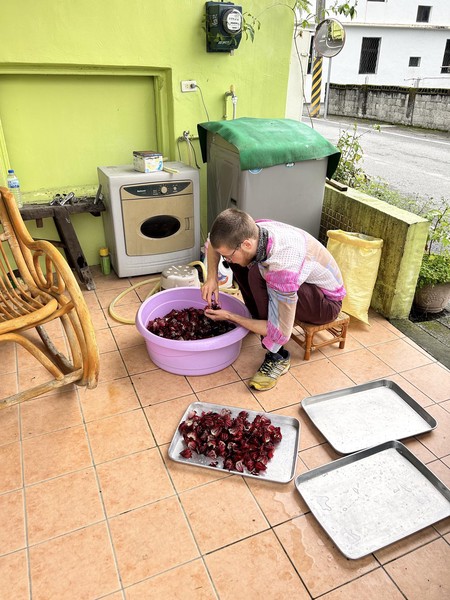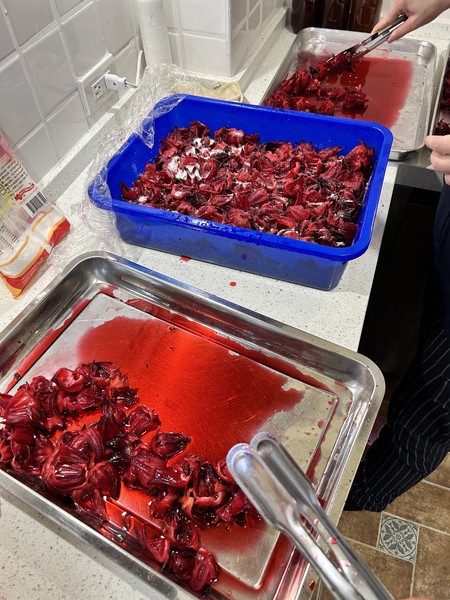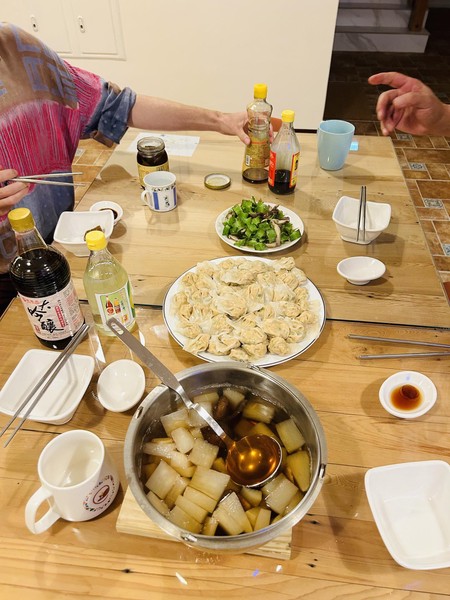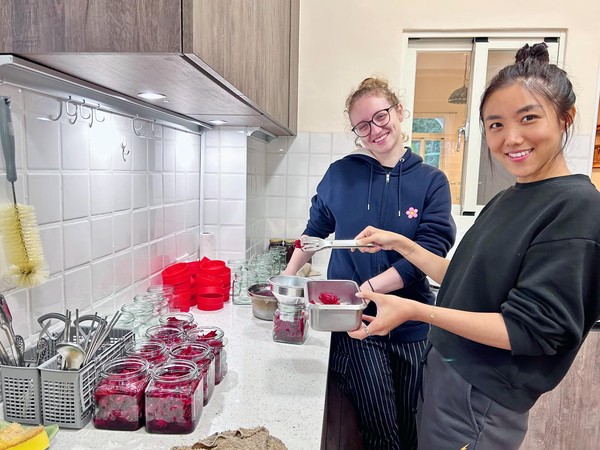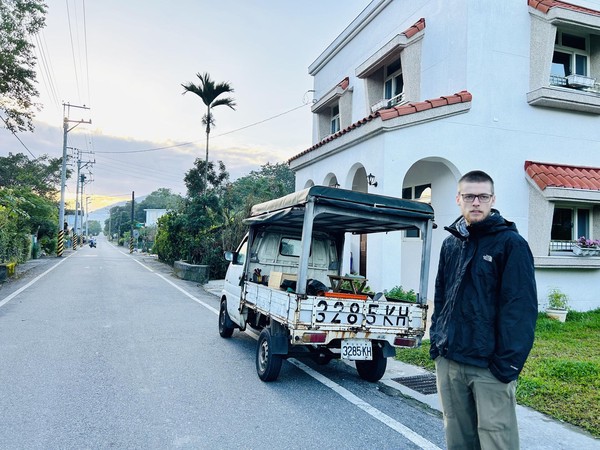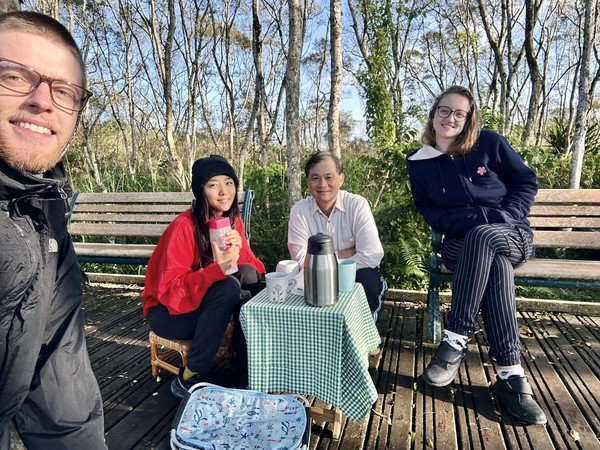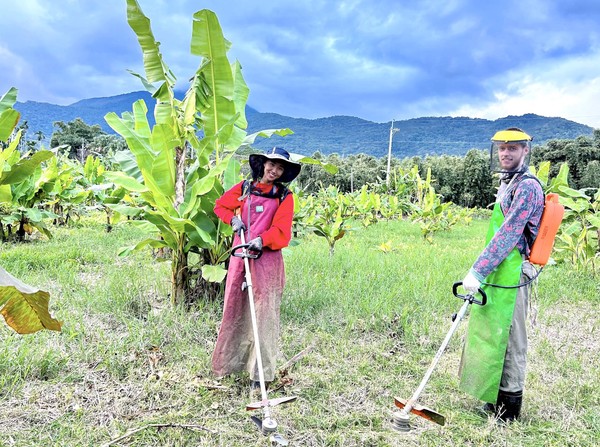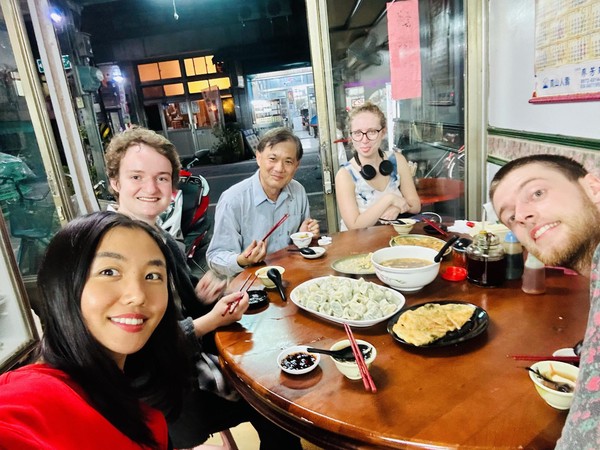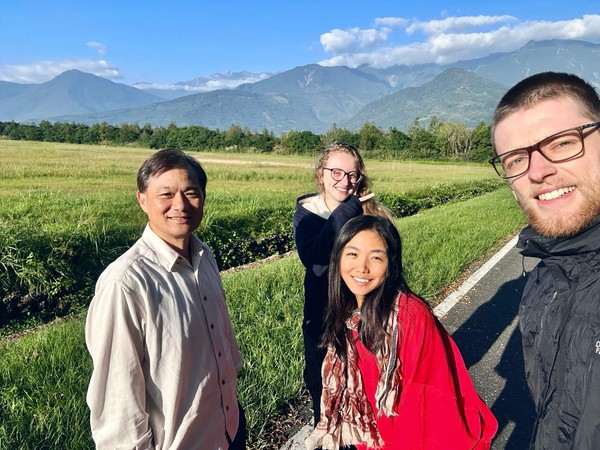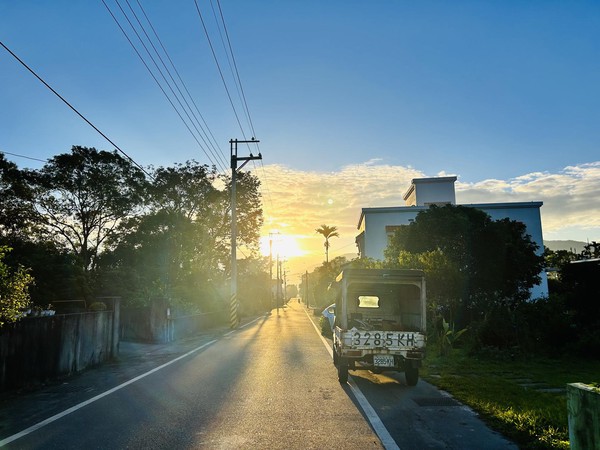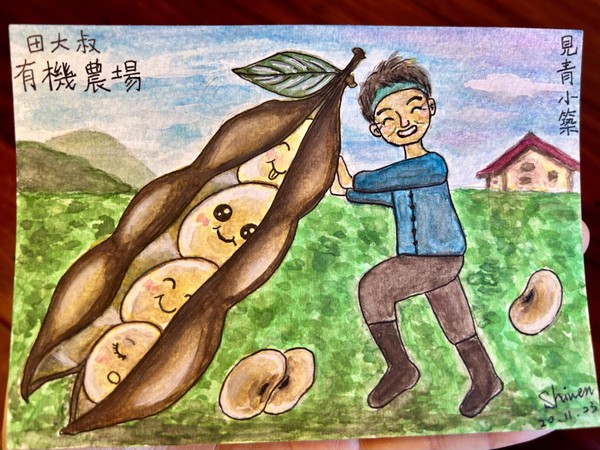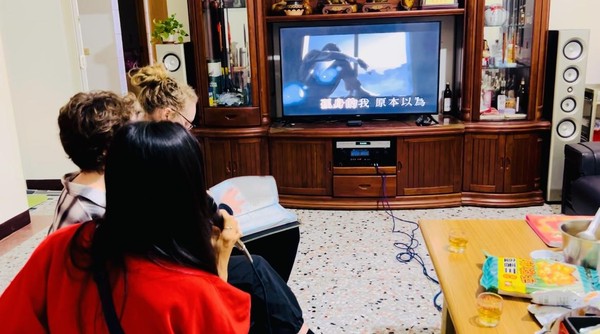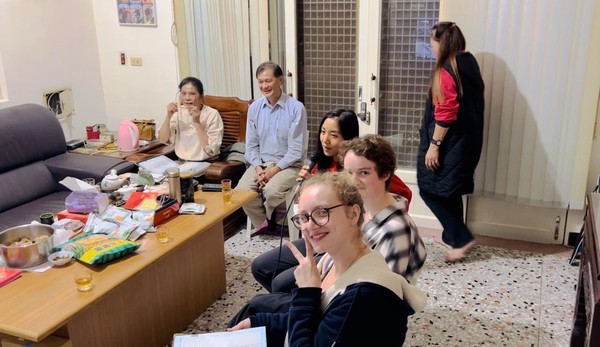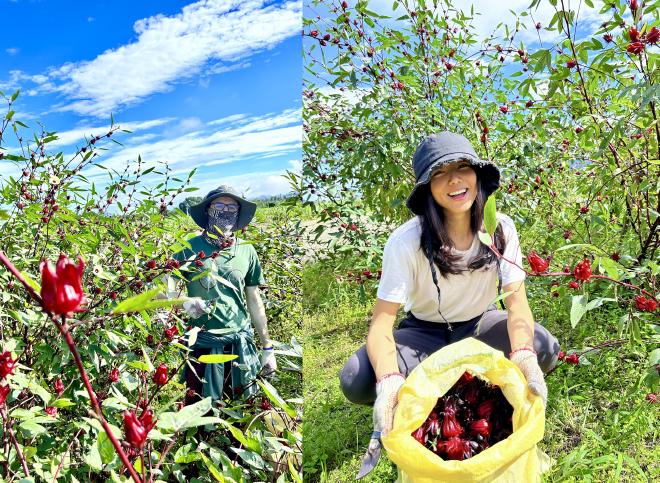
One of our most unforgettable experiences in Taiwan was working in Uncle Tien’s organic farm, which is located centrally on the east coast of Taiwan close to a small town called Guangfu. Having arranged our one week stay there already one month in advance, we had organized our itinerary to slowly make our way up the east coast and arrive in Guangfu in the middle of November. Uncle Tien has two plots of land, one banana and fruit tree plantation, one where mainly soybeans, other vegetables and roselle trees (a type of hibiscus) are planted. He explained his choice of plants is based on what he likes to eat personally and what turns out to grow well, the current composition of crops is the result of a trial and error process throughout the years. When we arrived in mid November, the soybeans had already been harvested weeks earlier and much of the ground on that plot of land was empty, besides the parts where roselle trees and various vegetables such as corn were planted. To reduce the impact of insects Uncle Tien only grows soybeans one half of the year, the other half he cultivates a mix of rapeseed and radish on the same land.
At the time of our arrival the most urgent work was roselle harvesting and sowing the rapeseed/radish seed mix. Shiwen and I were responsible for picking roselle sepals (part that surrounds and supports the flower petals and also contains seeds, which expands and matures into an accessory fruit) in the mornings and removing the seeds in the afternoons, while Uncle Tien sowed the seed mix. Harvesting the roselle fruits is based on the size of the fruits, which can be subjective and hard to judge as the size is relative. Once we picked the biggest ones, others suddenly started looking big enough as well, so the ones we picked would get smaller and smaller … Thus, it is important as well to know when to stop with one tree and move on to the next. We also needed to coordinate and plan who is doing which tree so that we don’t overlap or rework and get stuck in a cycle of “going smaller” as mentioned above. Working in the fields was truly meditative, with the smell of the fresh grass and fruity air, the singing of birds and insects, the touch of gentle wind and morning sunshine. It was very fortunate for us to be in the fields in the “winter” period, the morning and afternoon sun was quite comfortable, only the hours around noon it could still get pretty hot, which is why we had long midday breaks. The roselle fruit is processed into sweet pickle, jam and flower tea. For the tea, the fruit has to be dried in another factory, while the jam and the sweet pickle is produced directly at Uncle Tien’s place. One afternoon Shiwen and another volunteer helped with the process of making sweet pickle and it was really fun! It is a pity though we did not get to work on soybeans which are the source of the farm’s other main products: unprocessed soybeans and miso paste. To us soybeans are particularly interesting as soy-products are often essential parts of a vegetarian diet, especially many meat replacements are soy-based. Fun fact we did not know before: the first step of all forms of tofu and other soy-products is soymilk, which then gets further processed by various means. Hopefully we can make another visit to the farm at the right time for some work involving soybeans in the future.
After just being with the three of us for half of our stay, another volunteer from France arrived, Cyndel, and two days later a fourth one from Switzerland, Anna. They were both so lovely and we really enjoyed our activities together. It’s a great advantage to work in bigger farm with more workers so that we can meet and make new friends, learning about others and their stories. The accommodation provided consists of two big rooms with independent bathrooms, one shared by us, one shared by Cyndel and Anna. We were very happy to have much space and a clean, cozy environment, Uncle Tien had previously lived in one of the rooms himself, renting out the other one occasionally. The small house is located just a kilometer away from the plots of land in a small neighborhood on the outskirts of Guangfu. Next to our accommodation, a new 3-story building was just finished in the summer, Uncle Tien is opening a BnB/Homestay there to support his farming income and actually be able to sustain himself.
The farm is not only qualified as organic but Uncle Tien describes it as fully natural, which means 1) no plastic used 2) no fertilizer at all is used 3) no irrigation besides rain 4) as few machines used as possible. It’s also extremely important that the organic farms do proper protection against other farms’s pesticides and herbicides, usually using tall and sturdy plants as a natural barrier, which is another additional considerable burden. Similar to organic farming, yield is much lower than with conventional farming methods while cost is significantly higher mainly due to much higher labor costs, thus the products have to be much more expensive and are still barely profitable. But the products can’t be too expensive either because then even fewer people can afford it. It was shocking to learn that only 2% of farms in Taiwan are organic, but after knowing all the challenges it doesn’t come as a surprise anymore. From Uncle Tien we learned that the main challenges of running an organic farm in Taiwan can be summarized as: 1) high labor costs 2) lower yields 3) it generally takes longer to harvest 4) demand is very limited, main customers are retired people who care more about health and are willing to spend more on it 5) very little support from government 6) limited sales channels due to low amounts and long distances to customers. On top of all theses challenges, there are some conventional farmers spreading negative and false information about organic farming to secure their market, claiming it is impossible, it is a fraud and just a label to sell with higher price, or claim their own products are organic when they are not. In Taiwan organic farmers can’t rely solely on farming to support themselves, a second source of income is necessary. Some only take up farming as they retire and rely on their pension (like our previous hosts in Nantou, Minghua and Wenju), some have to do other jobs or rent out accommodation like Uncle Tien. By having guests in his homestay, they can visit his farm in person, which is more convincing than any advertisements, it’s also educational when they bring their kids and grandkids to the farm. Knowing all these challenges, we truly admire the determination, persistence, and strong belief all the organic farm owners have for a better environment and better health of human beings, it takes incredibly huge amount of courage and sacrifice. So we also hope our blog post can be somewhat educational and raise more awareness about organic farming so that more people would understand their hardships and choose more organic products. Not just to support the organic farms, but more to support a more natural and sustainable planet and better health for ourselves.
With the arrival of Cyndel and Anna, they took over roselle harvesting and processing while we helped with some of the finishing touches of the rooms in the new homestay, mostly installing curtains and also taking some pictures of the now fully finished rooms. On our last day we got the chance to try out weeding the banana plantation, Jannes was fully immersed in wielding the electric weed trimmer, Shiwen found it a bit too heavy and went for the small sickle to take care of the finer details close to the banana trees. Work throughout the week was split into morning and afternoon sessions, we generally had breakfast around 7 in the morning, lunch around 12:30 and dinner around 7. Uncle Tien prepared all 3 meals and even made them all vegetarian for us! There were all kinds of variations on traditional Chinese cuisine, all of the dishes used mostly self-grown vegetables, ranging from taro to baby corn and others we had never tasted before, like the excellent winged bean. That week must have been the most diverse and healthy diet we have had so far since starting our trip.
Besides the regular routine, Uncle Tien also took us sightseeing around the area for half a day, starting with an early sunrise breakfast on the edge of a forest looking over the fields with mountain ranges on each side. It was a wonderful experience, the beautiful scenery combined with gentle sunshine and a meal. That day we also visited an indigenous settlement, a prison with its own farm and former sugarcane fields now turned into big forest area with biking paths. The prison looked like a five star hotel with its own garden and farm fields, we were even secretly planning to commit a small crime so that we could live there shortly for free! One day after dinner we went to a nearby outdoor hot spring. We were so excited and chatting non-stop in the warm spring water till the guard chased us away to close the place. On our last night when we were having dinner we heard the neighbor’s karaoke session getting started and Cyndel asked whether we should join them. After dinner Uncle Tien went to the neighbors and got us invited to their karaoke night! It was fun, Cyndel and Jannes were singing in Chinese, which certainly astonished (in a good way) all the audience! It is pity that we couldn’t extend our stay it any longer as there were already other volunteers scheduled to arrive right after us. The 7 days we stayed felt like a holiday weekend, full of diverse activities and many conversations. We are grateful for having such a precious and satisfying experience during our trip, and trust that life will bring us back to this lovely farm again.
